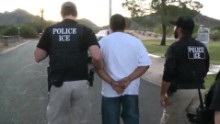Mother deported in Arizona immigration case that sparked protests
Story highlights
- Guadalupe Garcia de Rayos deported and sent back to Mexico, advocates say
- She could be first Arizonan to be deported under Trump executive order, attorney says
(CNN)Guadalupe Garcia de Rayos, a mother of two taken into custody during her yearly check-in with immigration officials in Phoenix, has been deported to her native Mexico, advocates working with her family said Thursday.
Carlos Garcia, director of immigration rights group Puente Arizona, told reporters that Garcia de Rayos had been deported to Nogales, Mexico.
US Immigration and Customs Enforcement said Garcia de Rayos was detained "based on a removal order issued by the Department of Justice's Executive Office for Immigration Review which became final in May 2013."
Garcia de Rayos said a prayer and attended Mass before her yearly immigration check-in Wednesday, according to advocates.
But her meeting ended differently than ones in previous years: She was taken into custody and ordered to be deported.
"Lupita has been doing yearly check-ins with ICE and nothing happened," said Lucy Sandoval, an activist who has been working with Garcia de Rayos' family. "But this is a different time."
Immigration advocates said they believe the woman's deportation reflects the Trump administration's hard line on illegal immigration.
"ICE had done what President Trump wanted -- which is deport and separate our families," Garcia said.

A protester locks himself to the van carrying Garcia de Rayos away.
Garcia de Rayos could be the first Arizonan to be deported under President Donald Trump's new executive order focused on removing undocumented immigrants with a history of arrests, Garcia's attorney told CNN affiliate KNXV-TV.
Any undocumented immigrant convicted or simply charged with a crime who hasn't been adjudicated could be deported under a new Trump administration policy announced last month.
Under the Obama administration, only undocumented immigrants convicted of a felony, serious misdemeanor or multiple misdemeanors were considered priorities for deportation.
In 2008, Garcia de Rayos was arrested in a workplace raid, convicted of felony impersonation and served six months in ICE detention before being released later that year, according to CNN affiliate KPHO/KTVK-TV. Originally from Mexico, she was in the country illegally.
"Relevant databases indicate Ms. Garcia De Rayos has a prior felony conviction dating from March 2009 for criminal impersonation," an ICE statement said.
Activists said the woman's conviction stemmed from a false Social Security card she used for employment.
'She wanted to confront this'
Garcia de Rayos prayed before her meeting Wednesday with ICE, Sandoval said. Activists warned her of the possibility of her detention and offered her sanctuary, but she decided to show up, Sandoval said.
"She wanted to confront this," the activist said. "She was brave. ... She's a woman of faith. Yes, they were praying. They were hopeful that there would be some consciousness and some heart."
On Wednesday evening, seven people were arrested outside the Phoenix ICE office when protesters attempted to block an agency van from taking Garcia de Rayos away.
Wednesday's protests were mostly peaceful, but police said on Twitter that "despite repeated warnings, some engaging in criminal acts" refused to stop.
About 7 arrests made without force. Everyone remains safe so far. Hoping for continued cooperation and no more criminal conduct.
Garcia de Rayos' husband and teenage children joined the protesters outside ICE headquarters.
Asked what she would ask Trump if she could, Garcia de Rayos' daughter Jaqueline told KNXV: "I'd ask him, 'Why he would want to take her from me?' She hasn't done anything wrong and I'm not scared of him."
Rights group blames Arpaio's crackdown
Puente Arizona, the advocacy group, said that Garcia de Rayos was a victim of the policies of former Maricopa County Sheriff Joe Arpaio. Enforcing identity theft laws was one of Arpaio's most well-known tools to crack down on illegal immigration in the border state.
Puente sued Arpaio, saying the workplace raids -- such as the one where Garcia was arrested nine years ago for using a fake Social Security number -- were unconstitutional and amounted to racial and ethnic profiling. It lost the case on appeal, but Arpaio disbanded the task force that conducted the raids.
A crackdown on illegal immigration
The immigration executive orders signed by Trump could amount to a vast expansion of authority for individual immigration officers and a dramatic increase in efforts to detain and deport undocumented immigrants.
The order lays out a series of categories of undocumented immigrants that immigration law enforcement officials should prioritize for removing from the country, a reaction to what was criticized by the right as lax enforcement of immigration law by President Barack Obama.
The Obama administration had prioritized expulsion of undocumented immigrants who threatened public safety or national security, had ties to criminal gang activity, committed serious felony offenses or were habitual misdemeanor criminal offenders.
Trump's order goes far beyond that, using a sweeping definition of "criminal" and giving a single immigration officer the ability to make judgments on threats to public safety.
The order says the priority will be removing deportable immigrants who "have been convicted of any criminal offense; have been charged with any criminal offense, where such charge has not been resolved; have committed acts that constitute a chargeable criminal offense; have engaged in fraud or willful misrepresentation in connection with any official matter or application before a governmental agency; have abused any program related to receipt of public benefits; are subject to a final order of removal, but who have not complied with their legal obligation to depart the United States; or in the judgment of an immigration officer, otherwise pose a risk to public safety or national security."
CNN's Chris Boyette, Sara Finch and Tal Kopan contributed to this report.






















No comments:
Post a Comment